Featured
Fired After Pregnancy Announcement: Court Case Involving Pregnant Employee Sparks Online Debate
Most commenters agree she is legally right but feel the situation is unfair and doesn’t help women’s position in the workforce.
Published
8 months agoon

A court case involving a Chinese woman who was fired after announcing her pregnancy shortly after her probation period has become trending on Chinese social media.
The woman, referred to as Lili (莉莉, pseudonym), began working for the company in April 2023, signing a labor contract that was set to run until July 2026, with a three-month probation period.
However, after the probation period had ended, Lili unexpectedly received a termination letter citing “failure to meet probationary standards” and “unsatisfactory performance” as reasons for her dismissal. Just days before, Lili had informed her manager that she was pregnant. Believing the termination was unfair, Lili contested the decision.
The dispute first went to a labor arbitration board, which ruled in Lili’s favor. Unsatisfied, the company then escalated the case to court. Recently, a local court in Suzhou reviewed the case and found that the termination of Lili’s contract lacked legal grounds, as the company failed to provide sufficient evidence that her work was unsatisfactory. The notice of termination was also issued after the probation period had ended.
Although the company appealed the court’s decision to reinstate Lili’s employment, a second court also rejected the appeal, upholding the original ruling.
According to Chinese labor law, employers can only terminate employees during the probation period on valid grounds, such as failing to meet job requirements. The burden of proof lies with the company. Terminating an employee after the probation period is much more challenging (see: China Briefing), and certainly cannot be done because a female worker is pregnant.
However, there is often a gap between what the law states and how it is implemented in practice.
“If you get pregnant, you will take maternity leave, then I will certainly hire others, and you will be replaced”
Since the two-child policy went into effect in 2016, pregnancy-related discrimination has become more prevalent.
In 2021, Yaqiu Wang of Human Rights Watch authored a report titled “”Take Maternity Leave and You’ll be Replaced”: China’s Two-child Policy and Workplace Gender Discrimination” (link), which found widespread discrimination against pregnant women in the workplace.
The national policy for maternity leave in China is 98 days, including a period of 15 days before the birth.
According to women surveyed by various Chinese companies and women’s groups, women in China are often demoted, sidelined, or fired after becoming pregnant. Companies use discriminatory job ads favoring men or women who have already had children, or ask prospective female employees intrusive questions about their marital and childbearing status during job interviews. Some are even forced to sign contracts promising not to get pregnant during certain periods.
One human resources staff member reportedly told a female interviewee during a job interview in September 2020: “After you get married, you don’t have the final say about whether you have a child or not..If you get pregnant, you will take maternity leave, then I will certainly hire others, and you will be replaced.”
“Being overly clever and taking advantage of the situation may benefit one person, but it ends up harming everyone else.”
Despite the existing laws designed to protect women’s rights in the workplace, companies often find ways to avoid paying for maternity leave, or they simply choose not to hire female workers at all (also read: Pregnancy Discrimination in the Workplace by Ruixin Zhang).
Pregnant employees and working mothers sometimes also face harassment in the workplace, as some companies hope to push them to resign by making their work life unbearable. In Chinese, this kind of ‘maternity harassment’ is referred to as “chuān xiǎo xié” (穿小鞋), which literally means giving someone tight shoes to wear, making them uncomfortable.
With low fertility rates and a rapidly aging population, boosting birthrates has become a priority for Chinese authorities. While experts explore ways to encourage couples to have (more) children earlier, combating pregnancy discrimination in the workplace is more critical than ever.
In recent years, it is evident that Chinese official media have increased awareness about the illegality of terminating female employees due to pregnancy.
However, Lili’s story has not garnered much sympathy on social media.
While most commenters acknowledge that the woman is legally in the right and that the company was at fault, they still feel that the situation is unfair and does not help improve the position of women in the workforce.
Lawyer Zhuang Zhiming (庄志明) mostly highlighted the viewpoint of the company, and wrote on Weibo: “For the company, hearing about the pregnancy right after the probation period can feel like a thunderbolt—it’s nothing to be happy about and might even leave them feeling deceived. While childbirth is a citizen’s right, so is the right to work, and the right to work requires mutual effort. You choose the company, and the company chooses you. If the collaboration starts off on the wrong foot, even if the employee wins the lawsuit, the company can still terminate the contract once it expires.”
Another commenter on Weibo blamed ‘Lili’ for exploiting the rules: “This is not about not not providing a good working environment for women. It’s about her as a person. Her plan was to abuse the system and get paid during her maternity leave without contributing. That’s the problem. It’s not about sympathizing with the boss either. If it happened to you, you’d understand and be reasonable about it.”
One Weibo user even shared how her father, who runs a business, has become more cautious in monitoring the behavior of female workers during their probation period to see if they might be pregnant. Instead of condemning these practices, many believe that people like Lili are to blame, as they don’t expect female employees to become pregnant within the first year of their new position.
Other commenters also blame Lili for taking this route only for her own good, as it does not help improve the position of women in the workplace at all: “‘Little schemes’ and ‘clever tricks’ [like this] will only dig more holes in the path of other women. Mutual respect is what really matters; being overly clever and taking advantage of the situation may benefit one person, but it ends up harming everyone else.”
By Manya Koetse
(follow on X, LinkedIn, or Instagram)
◼︎ #怀孕员工试用期结束被辞公司被判违法# Huáiyùn yuángōng shìyòngqī jiéshù bèi cí gōngsī bèi pàn wéifǎ
“Pregnant Worker Fired After Probation Period, Company Ruled to be In the Wrong”
◼︎ ##女子试用期刚过宣布怀孕被解聘## Nǚzǐ shìyòngqī gāng guò xuānbù huáiyùn bèi jiěpìn
“Woman Fired After Announcing Pregnancy Right After Probation”
◼︎ 产假 Chǎn jià
Maternity leave
◼︎ 试用期 Shìyòngqī
Probationary period
◼︎ 穿小鞋 Chuān xiǎo xié
Giving someone tight shoes to wear; making things hard for someone by abusing one’s power
Spotted a mistake or want to add something? Please let us know in comments below or email us. First-time commenters, please be patient – we will have to manually approve your comment before it appears.
©2024 Whatsonweibo. All rights reserved. Do not reproduce our content without permission – you can contact us at info@whatsonweibo.com.
Manya is the founder and editor-in-chief of What's on Weibo, offering independent analysis of social trends, online media, and digital culture in China for over a decade. Subscribe to gain access to content, including the Weibo Watch newsletter, which provides deeper insights into the China trends that matter. More about Manya at manyakoetse.com or follow on X.

Chinese Language
Chinese New Nickname for Trump Mixes Fairy Tales with Tariff War
From Comrade Trump to the Tariff Beauty, Trump has many nicknames on Chinese social media.
Published
14 hours agoon
April 16, 2025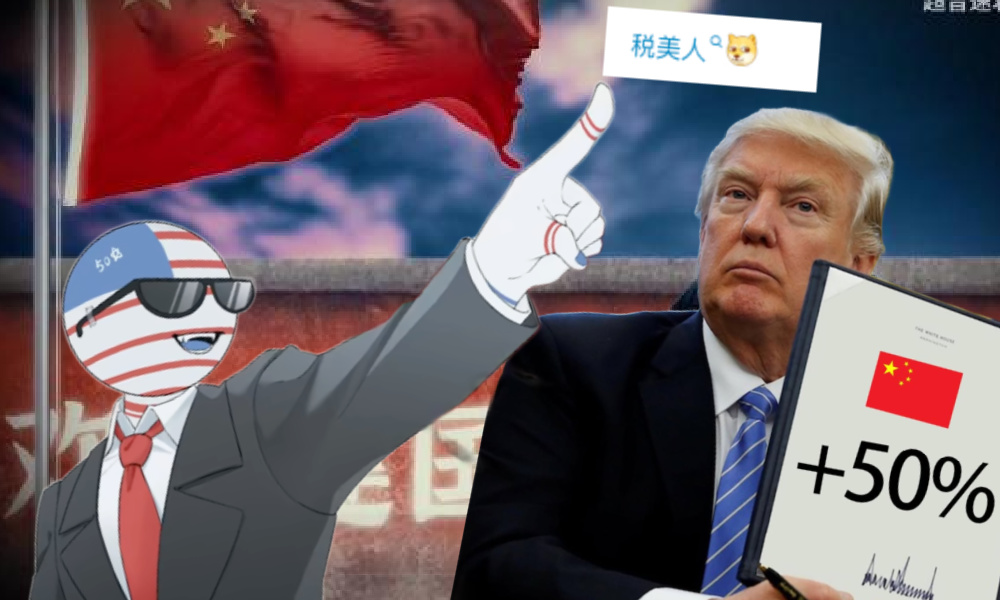
As the tariff turmoil between the US and China continues, President Trump has earned himself a new nickname on Chinese social media.
Over the years, Chinese netizens have come up with many different nicknames for the American President, whose Chinese name is usually transliterated as 川普 Chuānpǔ for phonetic reasons (read more here: Why Trump Has Two Different Names in Chinese).
But Chinese netizens call Trump many other things than just Chuānpǔ. You might have come across nicknames like “Comrade Build the Country” or “Build-the-Country Trump.”
Trump as China’s “Comrade Build-the-Nation”
“Build-the-Country Trump” or “Trump the Nation-Builder” (川建国 Chuān Jiànguó) has been an online joke on Chinese social media for years, often used alongside the related nickname “Comrade Build-the-Nation” (建国同志 Jiànguó Tóngzhì).
The joke began circulating in the early days of Trump’s first presidency in 2017, though even earlier there were humorous memes and satirical stories claiming Trump wasn’t truly American at all — the story goes that he was born in Zigong, Sichuan Province (四川自贡) in China.
When it was confirmed that Trump had won the presidency, proud Sichuan locals joked that he was one of their own, claiming that his Chinese name Chuānpǔ paid homage to their province, as it contained the “Chuan” from “Sichuan” (which literally means “river”). From this, an entire fabricated yet fascinating story about Trump’s Chinese roots emerged.
According to these stories circulating since late 2016, Trump’s father Fred Trump (referred to as Old Trump 老川普) was a businessman who came to China during World War II and stayed until 1947, a year after Donald’s supposed birth. This version of events claims that Old Trump lived through both the Anti-Japanese War and the Chinese Civil War while in China.
The story further claims that the Trump family lived on Guangda Street in Zigong’s Guojia’ao neighborhood (光大街郭家坳), now the site of the Salt Industry Drilling Team’s club. Trump was said to have been born there before leaving China. Zigong is known for its high-quality, expensive salt, and according to the tale, Old Trump shipped this salt to northern China or back to the US, earning a fortune that laid the foundation for the Trump family’s future wealth — and Trump’s eventual rise to the White House.
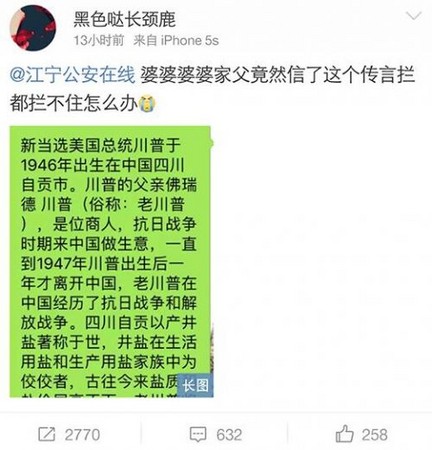
Old screenshot from a Weibo user who found it funny to discover the father-in-law actually believed the fabricated story about Trump being from Sichuan.
What does this entire online fairy tale have to do with Trump’s old nicknames? When Trump was in power, it soon appeared that he was doing all kinds of things that raised eyebrows. He once said that Korea used to be part of China, and then made a series of moves — like withdrawing from the Trans-Pacific Partnership, pulling out of the Paris Climate Accords, and announcing that the US would leave UNESCO — which Chinese netizens saw as a weakening of US global influence, and therefore indirectly as a boost to China’s rising power. The trade war and Trump’s tough stance on Chinese tech companies were also, in a way, seen as forcing China into tech self-reliance, further accelerating the country’s domestic innovation.
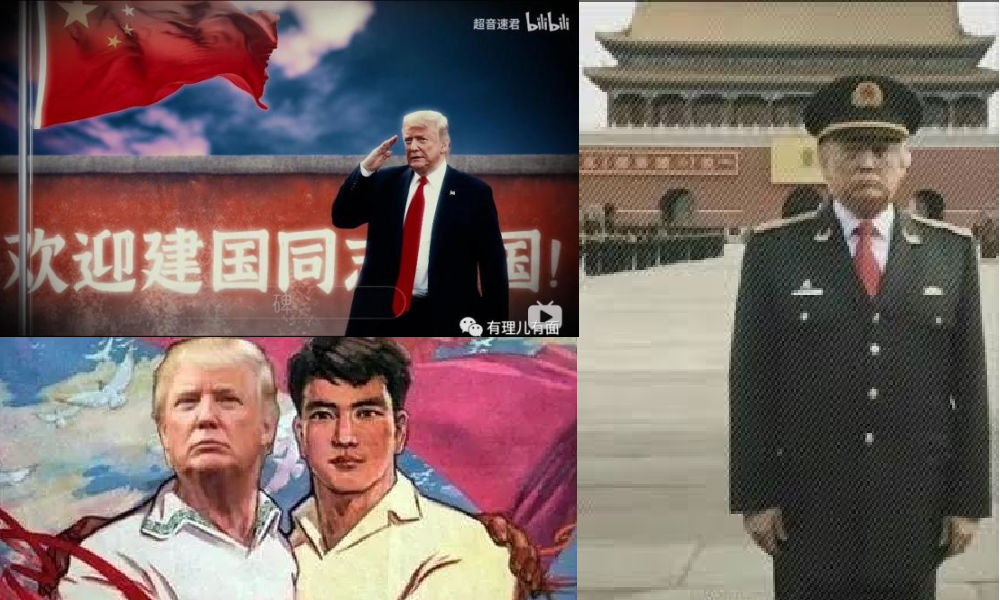
Comrade Trump memes.
All of this combined earned Trump the nickname “Comrade Build-the-Nation,” jokingly fuelling the idea that he was actually China’s ‘secret agent’ on a mission to undermine American imperialism and support China’s rise on the world stage.
Trump the “Tariff Beauty”
Trump’s latest nickname incorporates some of the same sentiments that led to him being jokingly called a “comrade” of China.
Amid ongoing tariff tensions, some Chinese netizens,including some creators of meme-style ‘nation personification’ videos (鬼畜动画) on Douyin and Bilibili, as well as some commenters on Weibo and Xiaohongshu, have started referring to Trump as “税美人” (shuìměirén), which literally means “Tariff Beauty.”

Meme-style videos on Bilibili and Douyin titled “Shuimeiren.”
The nickname is a clever pun, since it sounds exactly the same as the Chinese name for the Sleeping Beauty fairytale: 睡美人 (shuìměirén) (there is also a South Korean 2016 movie of the same name 税美人, Tax Beauty).
What makes the nickname extra catchy is the wordplay: “税” (shuì) means “tax” or “tariff,” and “美” is also an abbreviation for America (from Měiguó, 美国). So, “税美人” not only brings to mind a fairytale princess, but also evokes the idea of “the American who taxes,” perfectly capturing Trump’s dramatic tariff policies in a playful way.
The nickname was especially used in comment sections when Trump began threatening additional tariffs, eventually bringing the total tariffs on Chinese goods to 145% on April 10.
Meanwhile, the “Comrade Trump” meme is more relevant than ever. Both China’s official and unofficial reactions to Trump’s tariffs reflect a general belief that the policies will ultimately harm the American economy and its global influence, while boosting China’s domestic market (also read our latest here).
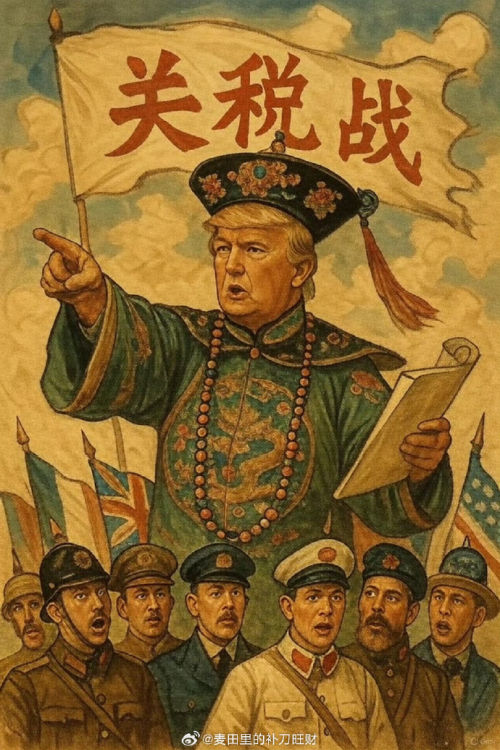
Trump the Tariff Beauty, on Weibo.
On April 16, Harvard University Assistant Professor Moira Weigel published a commentary titled “Long Live Comrade Trump’s Tariffs” in The New York Times, which was later elaborately discussed by Chinese media outlet Guancha.
The article opens by briefly referencing China’s “Comrade Build-the-Nation” meme. Weigel argues that there’s some truth to the sentiment behind the nickname, suggesting that Trump’s tariffs won’t bring manufacturing back to the US, but will instead strengthen China’s position in global e-commerce. She notes that Americans will simply end up paying more for the same goods they’ve always bought, while Chinese companies are accelerating innovation, expanding internationally, and finding clever ways to circumvent tariffs by working with third-party companies and establishing US-based warehousing.
There’s perhaps also another layer to Trump’s new nickname — it also suggests that he is asleep, and, meanwhile, like the “Comrade” meme, is actually hurting the US and strengthening China. One netizen suggested that when it momentarily seemed Trump was backing down by exempting electronic goods from the tariff, a handsome prince had given him a kiss that made him wake up.
But with Trump later declaring that there was no “exception” at all, it seems that the confusion — as well as tariff tensions — are only growing. For now, there’s no happy ending in sight.
By Manya Koetse
(follow on X, LinkedIn, or Instagram)
PART OF WHAT’S ON WEIBO CHAPTER: “THE US-CHINA TARIFF WAR ON CHINESE SOCIAL MEDIA“
Spotted a mistake or want to add something? Please let us know in comments below or email us. First-time commenters, please be patient – we will have to manually approve your comment before it appears.
©2025 Whatsonweibo. All rights reserved. Do not reproduce our content without permission – you can contact us at info@whatsonweibo.com.
China Insight
China Reacts: 3 Trending Hashtags Shaping the Tariff War Narrative
From historic speeches to trending slogans, this is China’s official media response to the US tariff escalation.
Published
3 days agoon
April 13, 2025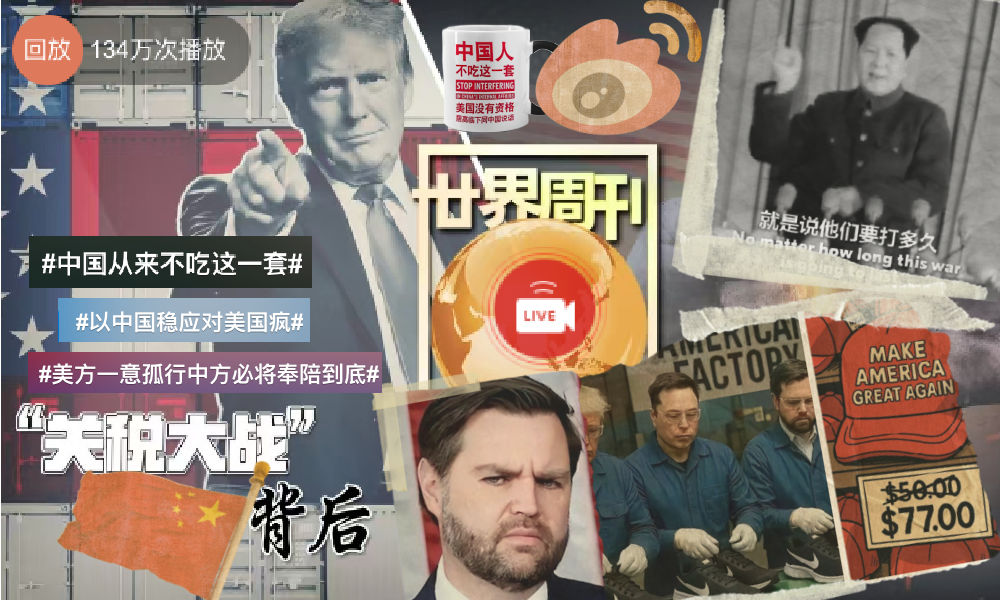
What do Mao’s 1953 Korean War speech and Yang Jiechi’s 2021 Alaska Summit remarks have to do with the escalating US–China trade war? In Chinese official media responses, history and emotionally charged rhetoric are used to clearly signal China’s stance and boost national confidence. Here, we explore three dominant narratives.
As you probably know by now, April 9 marked “D-Day” for Trump’s rollout of steep tariffs. On Chinese social media, the escalating trade war between China and the US dominated conversation, especially on that “D-Day Wednesday,” when nearly all of Weibo’s top 10 most-viewed hashtags were related to Trump’s tariffs and China’s retaliation.
Since developments are unfolding rapidly, here’s a quick recap:
- 🇺🇸💥 On Wednesday, April 2, President Trump announced steep new tariffs, including a universal 10% “minimum base tariff” on all imported goods, and an additional 34% reciprocal tariff specifically targeting China as part of the so-called “Liberation Day,” set to begin on April 9. Combined with pre-existing tariffs, this would bring the total tariff rate on Chinese goods entering the United States to over 54%.
- 🇨🇳⚔️On Friday, April 4, China’s State Council Customs Tariff Commission Office issued an announcement stating that, starting April 10, an additional 34% tariff would be levied on all imported goods originating from the United States, on top of existing tariff rates.
- 🇺🇸⚔️On Tuesday, April 8, Trump vowed to increase tariffs on Chinese exports by an additional 50% if Beijing would not withdraw its 34% counter-tariffs.
- 🇨🇳💥On Wednesday, April 9, China’s finance ministry announced it would further raise tariffs on US goods to 84% starting the following day, in retaliation for the newly imposed 104% tariff on Chinese goods.
- 🇺🇸💣On Wednesday, April 9, Trump then did a U-turn and halted the new steep tariffs for dozens of countries for 90 days, except for China, followed by yet another threat of an additional 21%, bringing those import taxes to 125%.
- 🇺🇸🚨On Thursday, April 10, it was clarified by the White House that tariffs on China would actually total 145%, combining the previously announced 125% with a 20% import tax levied for fentanyl smuggling.
- 🇨🇳💣On Friday, April 11, Chinese official channels reported that China would adjust its tariff measures on important goods from the US starting April 12, raising the rate from 84% to 125%. A related hashtag became no 1 trending topic on Weibo, where it received over 500 million views by Friday night (#对美所有进口商品加征125%关税#).
- 🇺🇸⬅️ On Friday, April 11, Trump’s administration announced that it will exempt smartphones, computers and some other electronic devices from the new tariffs, including the 125% levies imposed on Chinese imports (#特朗普政府再度退缩#; #美国免除智能手机电脑对等关税#).
There are hundreds of hashtags and trending topics circulating across Chinese platforms — from Weibo to Toutiao, from Kuaishou to Douyin — related to the latest developments in the US–China trade war. The topic is super popular, but censored comment sections and removed images also reveal just how sensitive it can be at times.
The biggest hashtags and slogans are those initiated and amplified by official channels. From press conferences to hashtags and visual propaganda, you can see a clear strategic media narrative that draws on history, national pride, and patriotism to frame recent developments, mobilize public sentiment domestically, and show China’s resilience to the rest of the world.
Here, I’ll highlight three hashtags that have recently become top trending, each representing a different kind of official narrative or rhetoric in response to the ongoing developments.
1. China Won’t Back Down
(China will see it through to the end #美方一意孤行中方必将奉陪到底#)
The message that China will not be intimidated by the US is one that echoes across Chinese social media these days, reinforced by official channels.
On April 9, the Weibo account of Chinese media outlet Guancha (@观察者网) and the state-run New Era China Foreign Affairs Think Tank (@新时代中国外交思想库) posted a video showing part of a speech given by Mao Zedong on February 7, 1953, during the final stages of the Korean War at the 4th Session of the 1st National Committee of the Chinese People’s Political Consultative Conference (CPPCC).
In the short fragment, Mao Zedong says:
🇨🇳📢 “As to how long this war will last, we are not the ones who can decide. It used to depend on President Truman, and it will depend on President Eisenhower, or whoever becomes the next US President. It’s up to them. No matter how long this war is going to last, we’ll never yield. We’ll fight until we completely triumph.”
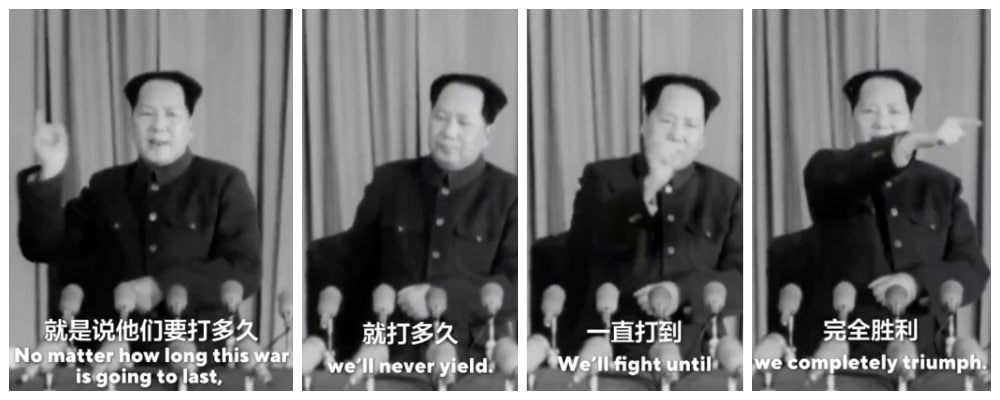
The 1953 speech by Mao was also posted on the US social media platform X by Mao Ning (@毛宁), spokesperson for China’s Ministry of Foreign Affairs. The video was then also spread by blogging accounts and regular netizens. History blogger Zijin Gongzi (@紫禁公子), who has over 435k fans on Weibo, reposted the video, writing:
💬 “Our forefathers never bowed their heads to strong enemies. How could we easily accept defeat? (..) We must not lose this spirit, we must let everyone know that we have a strong backbone and will never bow down.”
Together with the Mao video, the hashtag used by the Think Tank and many other Chinese media accounts, such as People’s Daily (@人民日报), is “If the US obstinately clings to its course, China will fight to the end [lit. accompany them to the end]” (#美方一意孤行中方必将奉陪到底#) and “fight to the end” (#我们奉陪到底#).
These phrases in part come from a press conference given by Ministry of Foreign Affairs spokesperson Lin Jian (林剑) on April 8. Here, he said:
🇨🇳📢 “I want to emphasize once again that there are no winners in trade wars and tariff wars, and protectionism is no way forward. The Chinese people do not provoke trouble, but they are also not afraid. Pressure, threats, and blackmail are not the proper ways to deal with China. China will inevitably take necessary measures and resolutely safeguard its legitimate rights and interests. If the American side disregards the interests of both countries and the international community and insists on waging a tariff war and trade war, China will fight to the end [lit. inevitably accompany them to the end 中方必将奉陪到底].”
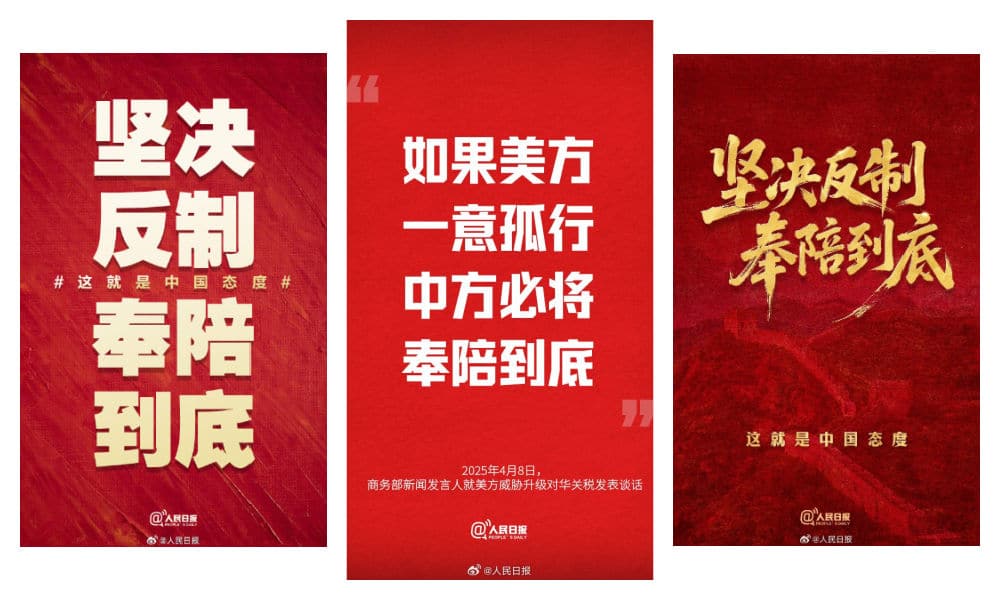
The next day, these words had been turned into digital propaganda posters, with some slight variations in the phrases used. One People’s Daily graphic underlined: “We resolutely take countermeasures, and follow through until the end (坚决反制 奉陪到底),” accompanied by the line: “This is China’s attitude,” which was also turned into a hashtag (#这就是中国态度#).
2. This Is No Way to Deal with China
(Chinese people aren’t buying it #中国人从来不吃这一套#)
Another related yet somewhat different sentiment that dominates Chinese social media—led by official channels—is that China is not only rejecting the trade games played by the US, but is also distancing itself from the American playbook. The message is: this is no way to deal with China. This narrative, and the hashtag surrounding it, emerged slightly later than the first. While the earlier phrase about China not backing down trended as China matched the US in its tariff measures, this one took off with China’s final blow—raising the rate on US imports from 84% to 125% in response to the latest US tariff hikes.
The April 11 statement on the Ministry of Finance website (财政部网站), also posted on Weibo by Xinhua News (@新华社), announced that China would adjust its additional tariff measures on imports originating from the United States effective April 12. It also stated that China strongly condemns the US imposition of excessively high tariffs and will no longer engage in further tariff escalations:
🇨🇳📢 “Given that, at the current tariff level, US goods entering China effectively have no market viability, if the US continues to raise tariffs on Chinese exports to the US, China will no longer respond.”
The main hashtag used by Xinhua and many other media channels is “中国从来不吃这一套” (Zhōngguó cónglái bù chī zhè yī tào), which can be translated as: “The Chinese people have never accepted this,” or more colloquially, “We’re not buying it.”
The phrase initially became popular in 2021, after it was used by China’s top diplomat Yang Jiechi (杨洁篪) during the first major strategic talks of the Biden administration, held in Anchorage on March 19. Due to the occasionally heated exchanges between the two delegations, some called the Alaska talks a “diplomatic clash.”
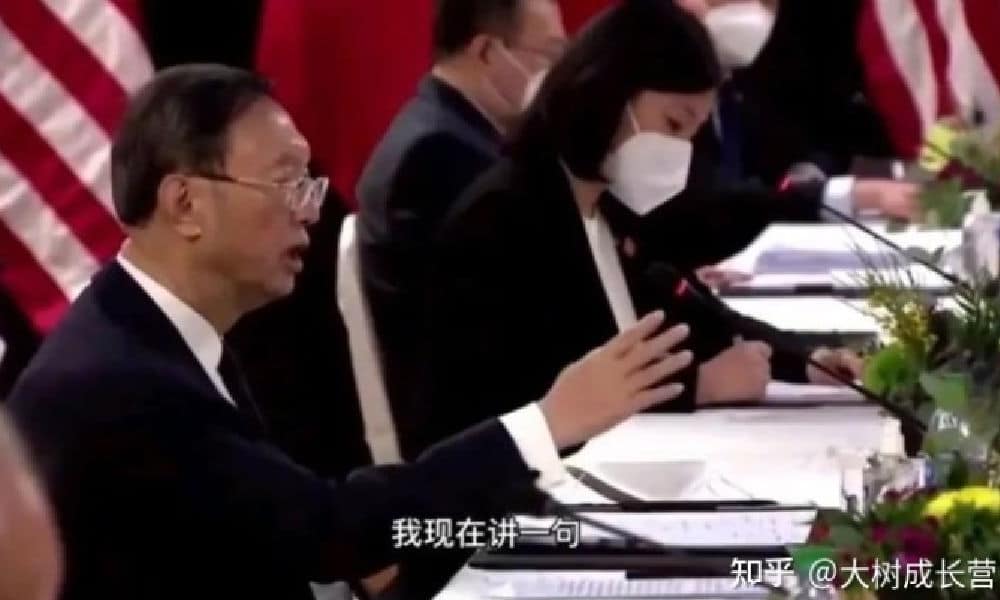
Yang Jiechi during the Alaska Summit
At the time, Yang delivered a lengthy statement to US Secretary of State Antony Blinken and National Security Advisor Jake Sullivan, stressing that Taiwan, Hong Kong, and Xinjiang are “inseparable parts of China,” and that China strongly opposes US interference in its internal affairs. Suggesting the US should focus more on its own human rights issues and racial problems instead of lecturing China, he added the now-famous line: “The US is not qualified to speak to China from a position of strength. The Chinese people don’t buy that” (美国没有资格居高临下同中国说话,中国人不吃这一套).
The phrase quickly went viral—boosted by state media, celebrated by netizens, and turned into a marketing slogan. It now appears on t-shirts, teacups, phone cases, and other patriotic merchandise.
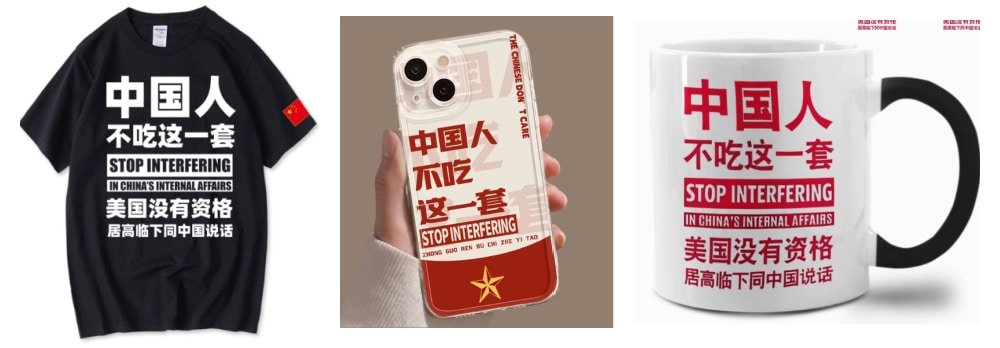
The translation of the phrase still triggers discussions. While merchandise typically translates it as “Stop interfering in China’s internal affairs,” that’s not an accurate translation. During the Alaska Summit, interpreter Zhang Jing (张京) (who gained viral fame at the time) translated it in real-time as “This is not the way to deal with the Chinese people.” However, some commentators and professional translators argued this was a missed opportunity to take a tougher stance, as the Chinese phrase is much sharper and could be loosely translated as: “We Chinese people don’t swallow this crap.”
In Alaska, Yang emphasized that dealing with China requires mutual respect, and that history will prove that trying to strangle China’s rise would ultimately hurt the US itself (“与中国打交道,就要在相互尊重的基础上进行。历史会证明,对中国采取卡脖子的办法,最后受损的是自己。”)
Similar sentiments now dominate online media discourse in China. The slogan has evolved from “The Chinese people don’t buy this” (中国人不吃这一套) to the more authoritative “China has never bought this” (#中国从来不吃这一套#)
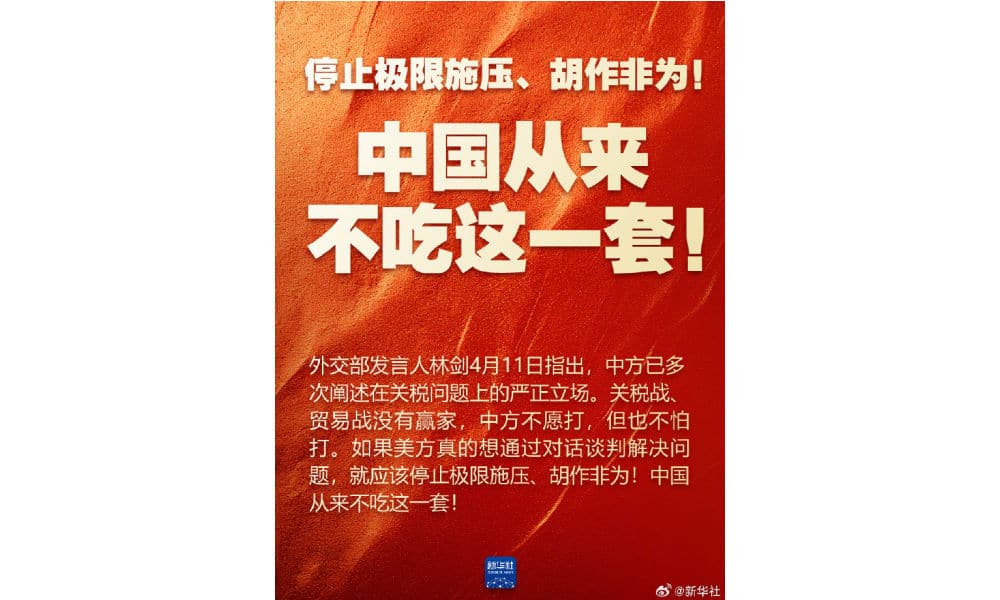
Adding fuel to this message are hashtags like “America’s repeated imposition of excessively high tariffs on China has become a joke” (#美方对华轮番加征畸高关税已沦为笑话#).
Ridiculing America (especially Trump) has become a popular pastime on Chinese social media this past week, with a flood of Chinese and international memes circulating widely.
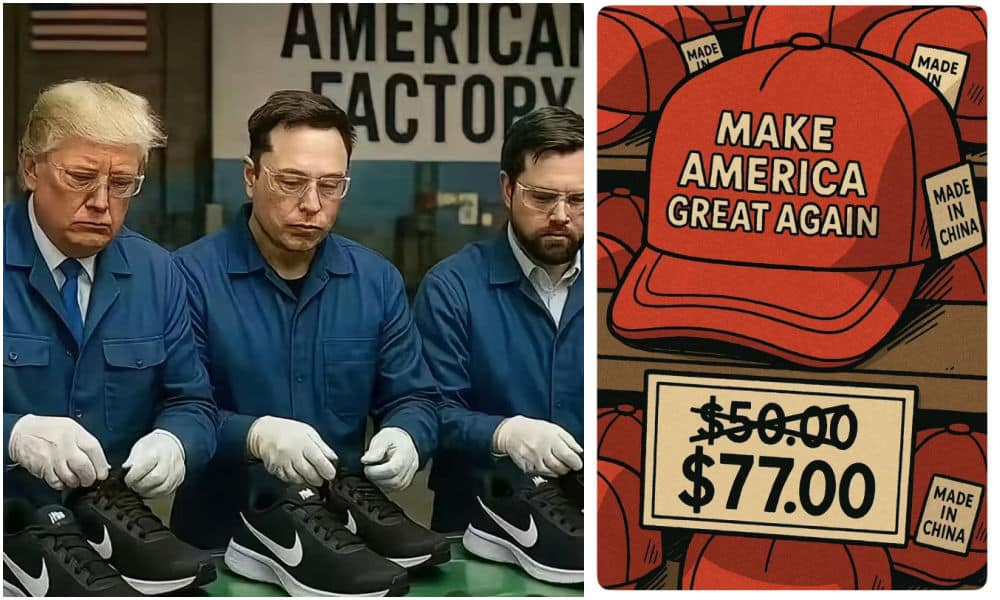
Especially popular are memes mocking the idea of America as a future “Made-in-America” manufacturing hub, the irony of iconic American products (like MAGA hats) being made in China, and how everyday essentials such as eggs have reached historic price highs in the US (a crisis partly caused by bird flu but now worsened by the tariffs).
On April 13, the hashtag “The 145% tariff makes one panda plush toy cost 80 dollars” (#145%关税让1只熊猫玩偶卖80美元#) also went trending, sparking jokes about how even the most trivial things could suddenly become luxuries in the US.
3. China is the Most Stabile Superpower
(Countering America’s madness with China’s stability #以中国稳应对美国疯#)
A third stance that has been dominant in Chinese official online discourse is that China’s development does not rely on anyone’s favors (#中国发展从不靠谁的恩赐#, derived from a quote by Xi Jinping), and that despite the US’s measures, China’s rise on the world stage cannot be stopped. In fact, the narrative suggests that these actions by the US are only accelerating China’s ascent.
A commentary piece published by state broadcaster CCTV (@央视新闻) on April 11 quoted Professor Li Haidong (李海东) of China Foreign Affairs University, who stated that the US’s increasingly aggressive behavior reinforces the notion that it is using tariffs as a tool of extreme pressure; as a weapon to serve its own interests. According to Li, this reflects America’s hegemonic mindset, aiming to assert superiority by intentionally creating crises.
But rather than strengthening the US, the commentary argues, these recent measures are backfiring and are damaging the US’s domestic economy and undermining its global credibility.
In contrast to the US’s presumed recklessness and “hysterical approach,” China is depicted as a “responsible world leader,” bringing certainty to an uncertain world by “responding with its own stability” and proving to be, supposedly, a more reliable engine of global growth. The commentary states:
🇨🇳📢 “As the tariff storm strikes, China is using its own ‘stability’ to resist the trials and tribulations, by upholding rules, defending justice, and steering the big ship of globalization through treacherous countercurrents, toward the right path of openness and cooperation.”
To promote the piece on social media, CCTV used the hashtag “Responding to America’s madness with China’s stability” (#以中国稳应对美国疯#).
This sentiment was echoed by nationalist bloggers, such as Tangzhe Tongxue (@唐哲同学), who posted on April 13:
💬 “In this world, besides China, the rest are all just a poorly equipped small-town theater troupe (草台班子).”
The phrase “草台班子” (cǎotái bānzi) literally refers to a makeshift opera troupe performing on a shabby rural stage, and is used to describe an incompetent group of amateurs.
The blogger’s comment indirectly responds to comments made by US Vice President JD Vance, who defended Trump’s tariffs in a Fox News interview by saying: “To make it a little more crystal clear, we borrow money from Chinese peasants to buy the things those Chinese peasants manufacture.”
That remark sparked controversy online, with many netizens calling it ignorant. Some pointed out that Chinese people were already wearing fine silks when Westerners were still wrapped in animal skins fishing in the sea, and flipping the narrative to portray Americans as the real “country bumpkins.”

Meme shared online.
This sentiment was reinforced by another hashtag trending on Weibo on April 13: “You think we’re scared, but we actually don’t care” (#你以为我们scared其实我们不care#).
That line comes from a Channel 4 interview with Gao Zhikai (Victor Gao/高志凯), Vice President of the Center for China & Globalization (CCG), who stated:
🇨🇳📢 “China is fully prepared to fight to the very end. Because the world is big enough that the United States is not the totality of the market in the world. So if the United States wants to go in that direction of completely shutting itself out of the Chinese market, be my guest. [Interviewer: Yes and China will lose the US market..] We don’t care. We don’t care. China has been here for 5000 years, and for most of the time there was no United States and we survived. If the United States wants to bully China, we will deal with the situation without the United States. And we except to survive for another 5000 years.”
While this reflects the official position and is widely echoed across social media, others stress the importance of remembering history; particularly China’s “Century of Humiliation” (百年国耻), which was marked by war, aggression, and unequal treaties imposed by foreign powers. Just like other historical anniversaries, some bloggers argue that Trump’s tariff “D-Day,” April 9, should not be forgotten (“今天是每个中国人难以释怀的日子”) and that it marks another reason for China’s renewed rise.
In a video posted by CCTV’s short video platform Xiaoyang Shipin (小央视频) on April 13 (link), the narrator states:
🇨🇳📢 “The so-called global “beacon” now puts “America first.” It slaps allies in the face, treats the world with predatory practices, and makes other countries pay for MAGA, pushing the fragile word economy over the edge, and pitching itself against the whole world. With China here, the sky won’t fall. With around 5% economic growth, China adds the output of a mid-sized European economy every year. China has hundreds of millions of skilled workers. The Chinese people are well known for their strong work ethic. China’s development over the past seven decades is a result of self-reliance and hard work, not favors from others, (..) Global businesses believe the next China is still China and the best is yet to come (..) Markets need to restore faith. Between the pond of closed markets, and the ocean of economic interconnectivity, which one would you choose?”
Overall, packaged across different media — from hashtags to short videos, from press conferences to news reports, and from digital slogan posters to Ministry of Foreign Affairs tweets — China’s strategic political media messaging is clear and quite powerful, despite the fragile and censored environment it operates in: China is not afraid to strike back, China will lead with calm, and eventually, China will emerge as the winner. Whatever happens next remains to be seen, but when it comes to turning crisis into opportunity, China’s official media channels have already done just that.
By Manya Koetse
(follow on X, LinkedIn, or Instagram)
THIS ARTICLE IS PART OF WHAT’S ON WEIBO CHAPTER: “THE US-CHINA TARIFF WAR ON CHINESE SOCIAL MEDIA“
Spotted a mistake or want to add something? Please let us know in comments below or email us. First-time commenters, please be patient – we will have to manually approve your comment before it appears.
©2025 Whatsonweibo. All rights reserved. Do not reproduce our content without permission – you can contact us at info@whatsonweibo.com.
Subscribe

Chinese New Nickname for Trump Mixes Fairy Tales with Tariff War
China Trending Week 15/16: Maozi & Meigui Fallout

China Reacts: 3 Trending Hashtags Shaping the Tariff War Narrative

No Quiet Qingming: From High-Tech Tomb-Sweeping to IShowSpeed & the Seven China Streams

From Trade Crisis to Patriotic Push: Chinese Online Reactions to Trump’s Tariffs

“Dear Li Hua”: The TikTok/Xiaohongshu Honeymoon Explained

Beyond the Box Office: What’s Behind Ne Zha 2’s Success?

Weibo Watch: A New Chapter

15 Years of Weibo: The Evolution of China’s Social Media Giant

Tuning Into the Year of the Snake

IShowSpeed in China: Streaming China’s Stories Well

TikTok Refugees, Xiaohongshu, and the Letters from Li Hua

The ‘China-chic Girl’ Image and the Realities of China’s Competitive Food Delivery Market

US-Russia Rapprochement and “Saint Zelensky”: Chinese Online Reactions to Trump’s Shake-Up

“Black Myth: Wukong”: From Gaming Screens to the CMG Spring Festival Gala?
Get in touch
Would you like to become a contributor, or do you have any tips or suggestions? Get in touch here!
Popular Reads
-

 China Insight11 months ago
China Insight11 months agoThe Tragic Story of “Fat Cat”: How a Chinese Gamer’s Suicide Went Viral
-

 China Digital10 months ago
China Digital10 months agoChina’s 2024 Gaokao Triggers Online Discussions on AI
-

 China Arts & Entertainment11 months ago
China Arts & Entertainment11 months agoSinging Competition or Patriotic Fight? Hunan TV’s ‘Singer 2024’ Stirs Nationalistic Sentiments
-

 China Arts & Entertainment12 months ago
China Arts & Entertainment12 months ago“Old Bull Eating Young Grass”: 86-Year-Old Chinese Painter Fan Zeng Marries 36-Year-Old Xu Meng








泰丽
August 29, 2024 at 3:53 pm
What a horrible scam this company tried to play on Lili and what horrible netizens condemning her. Why assume the worst? The government wants people to have children, but are doing nothing to support them, and it’s preposterous. If the Chinese government doesn’t look out and actually start taking steps to make life more equitable for women, they’re going to see their population dropping like a stone.